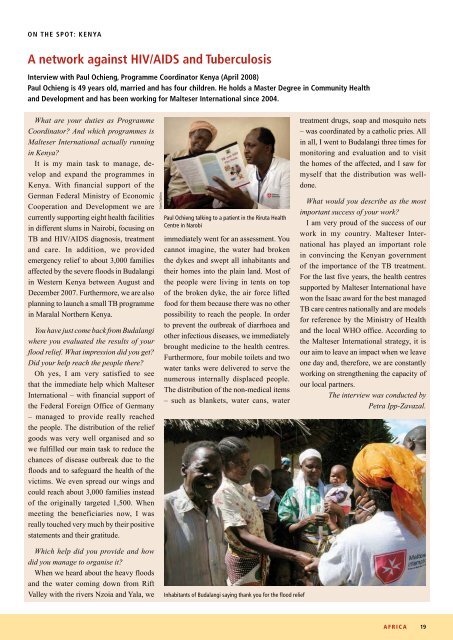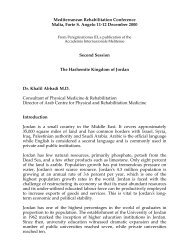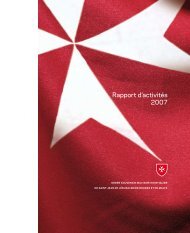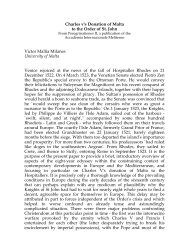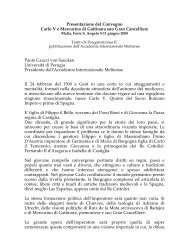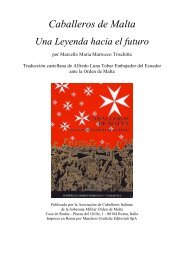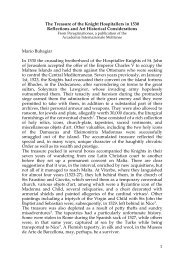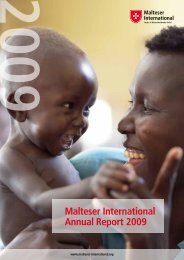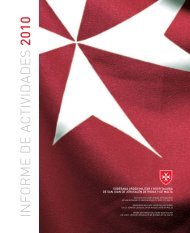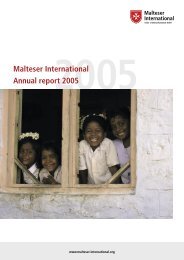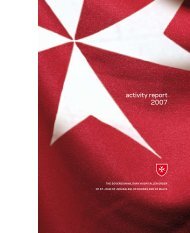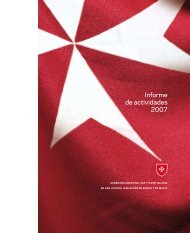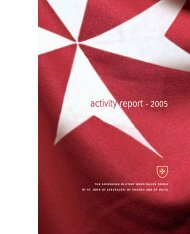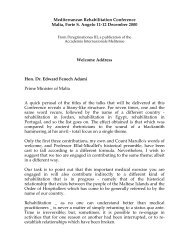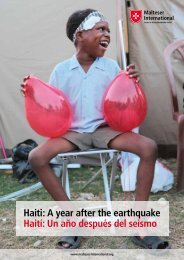Malteser International Annual Report 2007 - Ordine di Malta
Malteser International Annual Report 2007 - Ordine di Malta
Malteser International Annual Report 2007 - Ordine di Malta
Create successful ePaper yourself
Turn your PDF publications into a flip-book with our unique Google optimized e-Paper software.
On the spot: Kenya<br />
A network against HIV/AIDS and Tuberculosis<br />
Interview with Paul Ochieng, Programme Coor<strong>di</strong>nator Kenya (April 2008)<br />
Paul Ochieng is 49 years old, married and has four children. He holds a Master Degree in Community Health<br />
and Development and has been working for <strong>Malteser</strong> <strong>International</strong> since 2004.<br />
What are your duties as Programme<br />
Coor<strong>di</strong>nator? And which programmes is<br />
<strong>Malteser</strong> <strong>International</strong> actually running<br />
in Kenya?<br />
It is my main task to manage, develop<br />
and expand the programmes in<br />
Kenya. With financial support of the<br />
German Federal Ministry of Economic<br />
Cooperation and Development we are<br />
currently supporting eight health facilities<br />
in <strong>di</strong>fferent slums in Nairobi, focusing on<br />
TB and HIV/AIDS <strong>di</strong>agnosis, treatment<br />
and care. In ad<strong>di</strong>tion, we provided<br />
emergency relief to about 3,000 families<br />
affected by the severe floods in Budalangi<br />
in Western Kenya between August and<br />
December <strong>2007</strong>. Furthermore, we are also<br />
planning to launch a small TB programme<br />
in Maralal Northern Kenya.<br />
You have just come back from Budalangi<br />
where you evaluated the results of your<br />
flood relief. What impression <strong>di</strong>d you get?<br />
Did your help reach the people there?<br />
Oh yes, I am very satisfied to see<br />
that the imme<strong>di</strong>ate help which <strong>Malteser</strong><br />
<strong>International</strong> – with financial support of<br />
the Federal Foreign Office of Germany<br />
– managed to provide really reached<br />
the people. The <strong>di</strong>stribution of the relief<br />
goods was very well organised and so<br />
we fulfilled our main task to reduce the<br />
chances of <strong>di</strong>sease outbreak due to the<br />
floods and to safeguard the health of the<br />
victims. We even spread our wings and<br />
could reach about 3,000 families instead<br />
of the originally targeted 1,500. When<br />
meeting the beneficiaries now, I was<br />
really touched very much by their positive<br />
statements and their gratitude.<br />
Sven Torfinn<br />
Paul Ochieng talking to a patient in the Riruta Health<br />
Centre in Narobi<br />
imme<strong>di</strong>ately went for an assessment. You<br />
cannot imagine, the water had broken<br />
the dykes and swept all inhabitants and<br />
their homes into the plain land. Most of<br />
the people were living in tents on top<br />
of the broken dyke, the air force lifted<br />
food for them because there was no other<br />
possibility to reach the people. In order<br />
to prevent the outbreak of <strong>di</strong>arrhoea and<br />
other infectious <strong>di</strong>seases, we imme<strong>di</strong>ately<br />
brought me<strong>di</strong>cine to the health centres.<br />
Furthermore, four mobile toilets and two<br />
water tanks were delivered to serve the<br />
numerous internally <strong>di</strong>splaced people.<br />
The <strong>di</strong>stribution of the non-me<strong>di</strong>cal items<br />
– such as blankets, water cans, water<br />
treatment drugs, soap and mosquito nets<br />
– was coor<strong>di</strong>nated by a catholic pries. All<br />
in all, I went to Budalangi three times for<br />
monitoring and evaluation and to visit<br />
the homes of the affected, and I saw for<br />
myself that the <strong>di</strong>stribution was welldone.<br />
What would you describe as the most<br />
important success of your work?<br />
I am very proud of the success of our<br />
work in my country. <strong>Malteser</strong> <strong>International</strong><br />
has played an important role<br />
in convincing the Kenyan government<br />
of the importance of the TB treatment.<br />
For the last five years, the health centres<br />
supported by <strong>Malteser</strong> <strong>International</strong> have<br />
won the Isaac award for the best managed<br />
TB care centres nationally and are models<br />
for reference by the Ministry of Health<br />
and the local WHO office. Accor<strong>di</strong>ng to<br />
the <strong>Malteser</strong> <strong>International</strong> strategy, it is<br />
our aim to leave an impact when we leave<br />
one day and, therefore, we are constantly<br />
working on strengthening the capacity of<br />
our local partners.<br />
The interview was conducted by<br />
Petra Ipp-Zavazal.<br />
Which help <strong>di</strong>d you provide and how<br />
<strong>di</strong>d you manage to organise it?<br />
When we heard about the heavy floods<br />
and the water coming down from Rift<br />
Valley with the rivers Nzoia and Yala, we<br />
Inhabitants of Budalangi saying thank you for the flood relief<br />
Africa<br />
19


